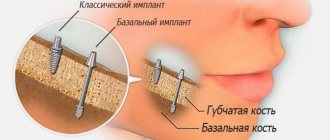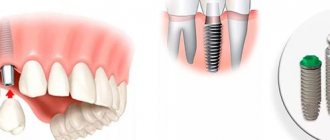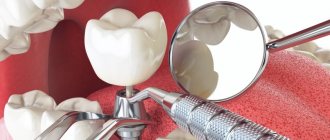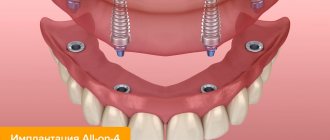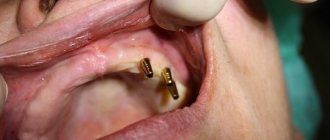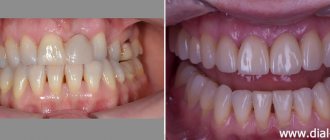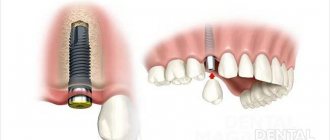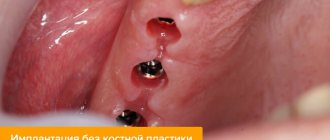Basal dental implantation pros and cons.
Most people understand that it is time to contact an implant dentist at the moment when the tooth is already significantly damaged and needs to be removed, or when it is no longer there. This makes us think about restoring our former beauty and we often wonder what implants and techniques to resort to to restore health.
Dental implantation in 2022 has become established in dental practice as the optimal method of replacing lost teeth. And, undoubtedly, dental implantation has many advantages over removable dentures, clasp dentures and orthopedic bridge structures, where natural teeth are ground into crowns and used as supports.
Moving from site to site with the question “dental implantation”, we often come across various methods and approaches to prosthetics. Each clinic, of course, is interested in you becoming its patient and describes various techniques and cutting-edge approaches to replacing teeth with crowns and implants. After reading advertisements on the Internet, we understand that there are quite a lot of options for implantation to solve the problem of lost teeth: basal dental implantation, single-phase implantation in Moscow, dental implantation “all on 4” implants or “All-on-4”, single-stage implantation, etc. .d.
But how do you know which method is right for you in your situation? The dental portal and forum for patients - 1dentist.ru conducted research in the field of development of implantology and advertising of clinics about implantation methods and indications for their use.
Dental implantation - procedure and types of implants
Dental implantation today is one of the most modern ways to regain a dazzling smile. However, the selection of implants itself is a rather difficult procedure, which cannot be dealt with without the help of a specialist. In addition, most dental clinics specialize only in certain types of implants, so finding the one that is right for you usually takes a lot of time. What should you pay attention to when deciding to get dental implants? Let's look at this issue in more detail.
Implantology exists relatively recently. It appeared in the 60s of the last century, thanks to research carried out in the field of osseointegration - the implantation of titanium into human bone. For the first time, the installation of an artificial titanium root in a human jaw was carried out in Sweden, but only 20 years after its discovery, this technique began to gradually gain popularity among organizations providing dental services. Today, the installation of dental implants is one of the most popular areas of dentistry.
Chain of dental clinics "Pearl Elephant"
An implant is a dental root made of titanium, installed in place of an extracted tooth. Titanium has a unique ability - it can implant itself into human bone tissue, which has made it possible to widely use it to create dentures.
A dental implant consists of 3 main elements, which include:
- An implant is the main part of an artificial tooth;
- A crown placed on the implant;
- Abutment is the connecting part of the implant and the crown.
The use of this design is very convenient, since it allows the replacement of an abutment or crown without the need to touch the implant.
Today, approximately 2,000 systems have been created that allow dental implantation. Moreover, the cost of installing an implant and its abutment directly depends on their manufacturer, cross-sectional shape, thread and other characteristics of the prosthesis being manufactured.
Technology for installing dental implants
The implant installation itself is not a very painful procedure. There are no nerve endings in human bone tissue, which means that all unpleasant sensations can only come from the gums, which have to be cut to provide free access to the bone. To relieve discomfort, dentists can use both local anesthetics and general anesthesia. The time spent on the procedure is usually no more than an hour.
Installation of implants - its main stages
After an incision has been made in the gum, a hole is made in the bone using a special drill, which must coincide with the shape of the implant being installed. After this, a special plug is installed into the implant, temporarily replacing the abutment, and a suture is placed on the gum. The gums heal from 7 days to 3 weeks. After this, the suture is removed and within several months the implant becomes accustomed to the bone tissue. After completing this stage, a small incision must again be made on the gum to remove the plug and place a special gum former, protruding slightly above it and shaped like the tooth being installed. As a rule, gum formation takes no more than 2 weeks. After this, the doctor makes an impression. Based on this impression, a crown is made, which, together with the abutment, is installed on the implant.
Which implants should be preferred? Their main varieties
Dental implants are divided into 3 groups:
- Intraosseous - they are divided into:
- Subperiosteal;
- Transosseous.
Plate – used extremely rarely, only if the bone in which the implant is placed does not allow the installation of its screw version; Root-shaped; Combined - the most popular is its screw modification, which can be made with different thread shapes, types of coating, be dismountable or not disassembled, and also differ in the steps required for its installation.
In order to correctly select an implant, you should pay attention to its main characteristics, which include:
- Manufacturer - domestically produced implants, as a rule, have a more affordable price, but their quality leaves much to be desired.
- Technical characteristics - structure and how exactly it is connected to the abutment.
In general, in order not to make a mistake with your choice, it is enough to adhere to several rules:
- Give preference to implants that have a porous surface - they take root much better than smooth ones.
- If possible, opt for an option that is not polished and has micro-threads.
- Give preference to the conical connection, since it is the most airtight.
Basal dental implantation
One of the widely advertised methods of implantation is basal implantation. Or, as it is also called, single-phase implantation or ROOTT implantation. This method of dental implantation has become popular relatively recently; in Russia it has been used for no more than 10 years.
This method has become famous thanks to the method of prosthetics, in which the patient receives new teeth in dentistry within 3 days after implantation!
Thus, patients have the opportunity to return to a full-fledged lifestyle much earlier than with traditional implantation with a waiting period for prosthetics of 3-6 months.
How is basal implantation performed?
After losing teeth for any reason (trauma, oral disease), it is very important to consult with an experienced dentist as soon as possible. After all, tooth loss is not only an aesthetic problem; after it, the normal structure of the dentition is disrupted, atrophy of the gum bone tissue occurs, and all the necessary conditions arise for the spread of pathological processes in the oral cavity. To restore your teeth, you should go for an initial consultation on implantation with a surgeon. The doctor will conduct all the necessary studies and recommend the best treatment option. If you are not bound by a time frame and prefer implantation with a guarantee, then the surgeon will never perform basal implantation.
Basal implantation takes an average of one week, and the number of doctor visits varies from three to five. Before implantation, a thorough preparation of the oral cavity is carried out, which consists of treating existing pathologies of teeth and gums, removing teeth and roots in the area of the upcoming implantation. One of the main competitive advantages of basal implantation is the absence of the need for bone grafting; the implant can be installed even immediately after tooth extraction in the interradicular septum. The installation of prostheses occurs 4-5 days after the insertion of the implants and thus the entire process takes no more than one week.
When is basal implantation used?
Why, then, in Russia did single-phase implantation, also known as basal implantation, not become so widespread earlier? Our independent portal 1dentist.ru found out that this method appeared in Russia when there were a lot of patients who were refused implantation procedures at dentists because they had been missing teeth for a long time and their bone condition had deteriorated significantly.
To restore bone tissue, it was necessary to undergo a long course of plastic surgery to “replant” the bone, as well as sinus lifting and augmentation of bone blocks. In Europe, basal implantation has been actively used since the mid-90s in Germany, Switzerland and France. With the advent of the first trained doctors in Russia, this method became an alternative for hopeless clinical cases.
Patients who had to get used to uncomfortable removable dentures or undergo long-term treatment to restore bones now have the opportunity to get teeth in 3 days!
Indications for basal implantation
Unfortunately, basal implantation is not applicable everywhere. Since this method is associated with prosthetics in the shortest possible time according to the express implantation protocol, then for long-term use and to guarantee the “survival” of implants, it is necessary to integrate at least 3-4 artificial roots to restore the chewing segment or 6-12 units to restore all teeth on jaws. To clarify the indications for use, we asked one of the leading experts in express implantation, an implantologist and maxillofacial surgeon, to comment and clarify.
The dentist Roman Viktorovich Bochenkov commented:
“Basal implantation is used in conditions of atrophy of the human jaw bone tissue. As a rule, this method is used for complete or partial edentia, to restore the chewing areas of the jaw, or in the complete absence of teeth. Implantation takes place on an outpatient basis and, if necessary, anesthesia can be used for the emotional comfort of patients. The basal implantation method implies a one-step method of implantation immediately after tooth extraction, since after removal there is bone tissue into which the implants are integrated. Basal implantation is also called single-phase, since the production of prostheses begins immediately after implantation and is fixed the next day. In this way, a full cycle of dental restoration occurs without a waiting period - a single-phase method of implantation.”
Summing up the interview with Roman Viktorovich, we can summarize that basal or one-stage implantation is carried out with:
- With complete absence of teeth on the jaw
- In case of partial absence of teeth in the jaw, if it is impossible to save existing teeth, or if they have no long-term prognosis for use
- In the absence of 2 or more chewing teeth
- For periodontitis in advanced stages
- If the “bridge” on your teeth collapses
- For maxillofacial operations
- Used in cases of diabetes mellitus in the stage of decompensation
Dental implantation in Omsk
What are implants made of?
Sometimes an implant is often understood as the entire structure that will be installed in the mouth. In fact it includes:
- implant - the “root” of the future tooth,
- abutment – connecting element,
- crown (or other type of denture).
Implant models differ in size in the range of 6–16 mm, the nature of the surface, the density of the thread, and the shape of the apex. All of them are made of titanium - it can fuse with bone. Titanium is so reliable that many manufacturers provide it with a lifetime free replacement guarantee: in case of failure, the manufacturer will provide a new implant. CosmoStom works only with such brands.
After implant installation
Recommendations after implant installation are in many ways similar to those the doctor gives after tooth extraction. Depending on the patient’s health status and existing diseases, individual recommendations may be added.
Dental surgeon-implantologist Guseinov Arif Eskendarovich listed the actions and restrictions that must be observed by all patients after implant installation:
Avoid eating for 2 hours.
For 7-14 days, exclude physical and temperature stress: bathhouse, sauna, gym, etc.
For 7-14 days, follow a gentle diet: food should be soft, not very hot and not very spicy. You cannot chew on an installed implant until the engraftment stage has passed.
Maintain oral hygiene: carefully, but completely.
Use an antiseptic chlorhexidine solution in your mouth 5 times a day for 7 days. You only need to keep the solution in your mouth and not rinse your teeth with it.
Strict intake of medications prescribed by your implantologist: antibiotics, anti-inflammatory or others.
Further, caring for a tooth on an implant is the same as caring for your own teeth. Regular brushing with a toothbrush and toothpaste, use of rinses and dental floss. An irrigator is excellent for caring for gums around an implant and dentures.
The implantologist will invite you for an examination after 7 days and after a month to make sure that healing is proceeding normally.
The doctor will also help the gum take on a shape in which the soft tissue will tightly grip the future crown. This is an important stage that will ensure aesthetics and high-quality hygiene in the gum area.
On average, 4 months after installation, the implantologist will refer the patient for diagnostics and assess the condition of the bone tissue around the implant. A stable implant is ready for prosthetics!
What is your dentist hiding from you?
After reading beautiful advertisements, some patients sit in the dentist’s chair without thoroughly understanding the method and experience of the specialists! During a face-to-face consultation with an implantologist, it is quite difficult for an ordinary person to make a decision - to trust the dentist or not? An experienced dentist will tell you both the pros and cons of each method used. However, some doctors miss some possible complications that may occur after undergoing treatment. Especially if there is not enough experience with total prosthetics of both jaws!
When choosing a clinic and doctor for basal implantation, pay attention to the dentist’s experience in total dental restoration! When performing basal implantation of both jaws, it is extremely important to take into account the pathology of the bite, the condition of the bone tissue, its quality and volume, as well as a study of the general health of the patients.
With a lack of experience, in addition to the loss of treatment results and rejection of implants - an extreme degree of complication, patients can acquire a number of seemingly insignificant, but extremely uncomfortable complications:
- A loose fit of the prosthesis to the gum leads to a lack of hygiene and an unpleasant odor
- If there is an error in prosthetics on the lower jaw, excessive salivation may occur
- An important aspect of total prosthetics is the restoration of the bite; lack of experience can lead to complications in the function of the temporomandibular joint (TMJ), which manifests itself as pain during chewing.
- Making a denture on the upper jaw requires sufficient skills of an orthopedic dentist so as not to cause speech dysfunction (difficulty in pronouncing hissing sounds)
- It is extremely important during the implantation process to install implants bypassing the maxillary sinus; some dentists claim that transsinus implantation (installation of implants through the maxillary sinus) does not cause complications, however, such statements end in long-term treatment of chronic sinusitis in the ENT office
- An experienced implantologist installs implants and manufactures prostheses with the expectation of further aesthetic prosthetics with metal-ceramic or other aesthetic prostheses.
- The key to the success of your future treatment lies precisely in the experience and manual skills of the implantologist, combined with the foresight of the orthopedic dentist! When restoring teeth using the basal express implantation method, your implantologist requires extensive knowledge of anatomy and skills in maxillofacial surgery!
Differences from other treatment options
In classical implantation, the implant is implanted into the spongy layer of bone tissue. With basal implantation, no reconstructive operations are performed and the implant is not installed in the main bone adapted to the load. The implant is installed into another structure - into the “basal bone”. This is synonymous with the cortical plate of the jaw bone, the outer layer of bone tissue that surrounds the cancellous bone in the form of an external frame and disappears later than others when the bone atrophies.
There is documented data confirming the presence of areas of this kind even with complete atrophy of the jaw bones. However, there is currently no data proving the long-term service of basal implants. Yes, the basal bone is much less susceptible to atrophic processes, but it is not suitable for reliable and durable installation of implants.
When selling such compromise solutions to the patient, the doctor emphasizes that before undergoing classical implantation, the patient must go through a complex and expensive process of increasing lost bone mass - bone grafting, which requires a long recovery period. And that basal implantation is the only optimal option for restoring the dentition for patients who have significant bone atrophy and contraindications to bone grafting, as well as fear of bone grafting.
None of this is entirely true. If you have a little free time, basic English and Internet access, you can easily find that all over the world this implantation technology is called Temporary Implantation and is never used anywhere to simulate permanent dental implantation. Yes, the basal (cortical) bone never atrophies, but what good is this if non-root-shaped implants with the thickness of a matchstick are installed? The biomechanics of chewing cannot be deceived and the masticatory muscles, trying to distribute chewing overloads to elements unsuitable for chewing, overload them. Overload leads to resorption of the last boundaries of the bone and rejection of the implants. It is very interesting to observe how orthopedists, knowing about this feature of basal implants, connect these structures with proprietary bridge-like structures, trying to strengthen it and prevent food from entering.
Basal implantation is called immediate loading implantation. This is true. Temporary implants are designed for this purpose. You can immediately install plastic temporary crowns on them, but this does not mean that already 2-3 days after implantation, it will be possible to install a ceramic denture and thereby permanently restore chewing function and get rid of the aesthetic defect.
Basal implantation price or cost?
So, basal implantation gives hope to patients who previously could not be helped without bone grafting! However, we are interested in both the cost of basal implantation and the turnkey price. Dentistry, in principle, is not a cheap service, but restoring the entire jaw is significantly different from making a removable denture.
Our independent portal analyzed the prices of 8 clinical centers in Russia that perform similar operations, and found that prices range from 180,000 to 350,000 rubles. The cost of basal implantation in Moscow is significantly lower than the cost in the regions, for example, basal implantation cost in Nizhny Novgorod, Saransk, and Kazan starts from 290,000 rubles. Basal implantation in Kirov reaches 350,000 rubles! Whereas in Moscow the price for ROOTT implantation (RUUTT) implantation or basal dental implantation averages 275,000 rubles. for the restoration of the upper jaw.
Basal implantation in Moscow. Basal Implantation Institute and Clinics
According to studies on our portal, no more than 10 dentists are engaged in basal implantation in Moscow, while there are no more than three specialized clinics with extensive experience in this method. One of the first in Russia to practice single-phase implantation was the clinics “Simpladent”, “dentalroott”, doctors from the clinics “Smile-at-once” and “Center for Express Implantation”.
Basal implantation promotions and discounts in Moscow clinics! Considering the cost of dental implantation, many patients expect special offers from clinics for treatment. Indeed, when searching for basal implantation clinics, cost is often a primary consideration along with choosing a dentist to perform the treatment.

